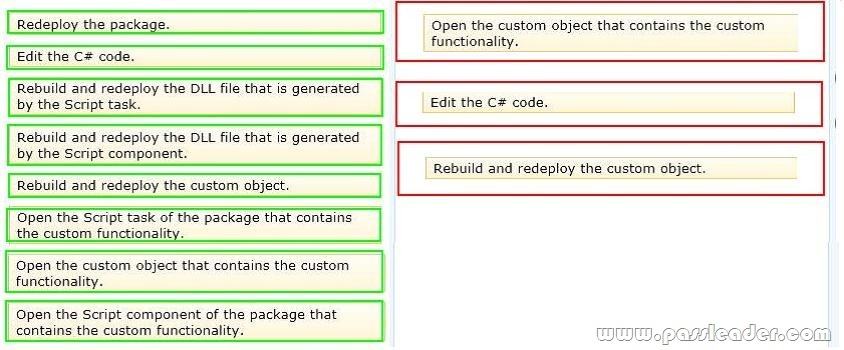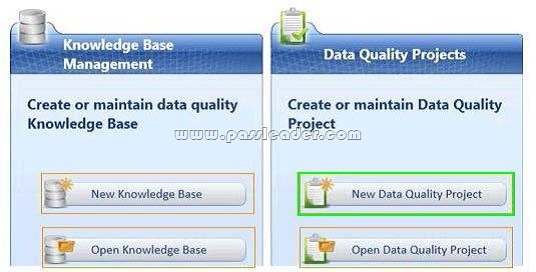Valid 70-767 Dumps shared by PassLeader for Helping Passing 70-767 Exam! PassLeader now offer the newest 70-767 VCE dumps and 70-767 PDF dumps, the PassLeader 70-767 exam questions have been updated and ANSWERS have been corrected, get the newest PassLeader 70-767 dumps with VCE and PDF here: https://www.passleader.com/70-767.html (318 Q&As Dumps –> 350 Q&As Dumps –> 377 Q&As Dumps –> 407 Q&As Dumps)
BTW, DOWNLOAD part of PassLeader 70-767 dumps from Cloud Storage: https://drive.google.com/open?id=0B-ob6L_QjGLpcXZXWUl4dHhIUVk
QUESTION 141
You develop a SQL Server Integration Services (SSIS) package in a project by using the Project Deployment Model. It is regularly executed within a multi-step SQL Server Agent job. You make changes to the package that should improve performance. You need to establish if there is a trend in the durations of the next 10 successful executions of the package. You need to use the least amount of administrative effort to achieve this goal. What should you do?
A. After 10 executions, in SQL Server Management Studio, view the Execution Performance subsection of the All Executions report for the package.
B. Configure the package to send you an email upon completion that includes information about the duration of the package.
After 10 executions, view the emails.
C. Enable logging to the Application Event Log in the package control flow for the OnInformation event.
After 10 executions, view the Application Event Log.
D. Enable logging to the Application Event Log in the package control flow for the OnPostExecute event.
After 10 executions, view the Application Event Log.
Answer: A
Explanation:
The All Executions Report displays a summary of all Integration Services executions that have been performed on the server. There can be multiple executions of the sample package. Unlike the Integration Services Dashboard report, you can configure the All Executions report to show executions that have started during a range of dates. The dates can span multiple days, months, or years. The report displays the following sections of information:
– Filter. Shows the current filter applied to the report, such as the Start time range.
– Execution Information. Shows the start time, end time, and duration for each package execution.
You can view a list of the parameter values that were used with a package execution, such as values that were passed to a child package using the Execute Package task.
QUESTION 142
Your team is creating SQL Server Integration Services (SSIS) packages that have several dependencies. The packages use parameters for configuration purposes. Your company’s IT policies include the following change control requirements:
– After a package is ready for deployment, your team must hand over the process to junior IT personnel.
– The process must guarantee that when a package has been validated, that same package (and all its dependencies) is deployed to production.
– The process must be repeatable and reliable and must be executed with the least administrative and training effort by junior IT personnel.
You need to use the most appropriate deployment unit to satisfy the company policies, while minimizing issues such as incorrect version or configuration. Which type of deployment unit should you use?
A. dtsx
B. SSISdeploymentmanifest
C. msi
D. ispac
Answer: D
QUESTION 143
You are developing a SQL Server Integration Services (SSIS) package. The package sources data from an HTML web page that lists product stock levels. You need to implement a data flow task that reads the product stock levels from the HTML web page. Which data flow source should you use?
A. Use an msi file to deploy the package on the server.
B. Open a command prompt and run the dtutil/copy command.
C. Add an OnError event handler to the SSIS project.
D. Open a command prompt and run the gacutil command.
Answer: B
QUESTION 144
You are developing a SQL Server Integration Services (SSIS) project by using the Project Deployment Model. The project is deployed to a single SSIS catalog, and transfers data to and from multiple databases hosted on SQL Server. The project must be configured to be able to export data to and from five different production servers that run SQL Server 2012. Each target server requires different values for connection strings and parameters in the SSIS project. You need to meet the requirements by using the least amount of administrative effort. What should you do?
A. For each target server, create separate registry entry configurations.
Select the registry entry at package execution time.
B. For each target server, create separate Environments in the SSIS catalog of the host SQL Server SSIS instance.
Select the appropriate Environment at package execution time.
C. Create one SSIS catalog Environment.
Change the values of each Environment variable at package execution time.
D. For each target server, create a separate XML configuration file.
Select the XML configuration file at package execution time.
Answer: B
QUESTION 145
You are developing a SQL Server Integration Services (SSIS) package to implement an incremental data load strategy. The package reads data from a source system. Depending on the value in a source column, the package redirects rows to one of five different data flow paths. You need to add a data flow transformation to support the package redirection. Which data flow transformation should you use?
A. Conditional Split
B. pjvot
C. Multicast
D. Lookup
Answer: A
QUESTION 146
You are developing a SQL Server Integration Services (SSIS) project that contains a project Connection Manager and multiple packages. All packages in the project must connect to the same database. The server name for the database must be set by using a parameter named ServerParam when any package in the project is executed. You need to develop this project with the least amount of development effort. What should you do? (Each correct answer presents part of the solution. Choose all that apply.)
A. Set the Sensitive property of the parameter to True.
B. Edit each package Connection Manager.
Set the ServerName property to @[$Project::ServerParam].
C. Edit the project Connection Manager in Solution Explorer.
Set the ServerName property to @[$Project::ServerParam].
D. Create a project parameter named ServerName.
E. Create a package parameter named ServerName in each package.
F. Set the Required property of the parameter to True.
Answer: CDF
Explanation:
C: from question: “The server name for the database must be set by using a parameter named ServerParam when any package in the project is executed.”
D: SSIS 2012 has introduced the concept of Project level connection managers. An SSIS project is generally more than one package. To simplify lives, the SSIS team now allows for the sharing of common resources across projects, connection managers being one of those resources.
F: When a parameter is marked as required, a server value or execution value must be specified for that parameter. Otherwise, the corresponding package does not execute. Although the parameter has a default value at design time, it will never be used once the project is deployed.
https://docs.microsoft.com/en-us/sql/integration-services/integration-services-ssis-package-and-project-parameters
QUESTION 147
You are completing the installation of the Data Quality Server component of SQL Server Data Quality Services (DQS). You need to complete the post-installation configuration. What should you do?
A. Install the Analysis Services OLE DB Provider.
B. Run the DQSInstaller.exe command.
C. Run the Configuration component in the Data Quality Client.
D. Make the data available for DQS operations.
Answer: B
QUESTION 148
You are developing a SQL Server Integration Services (SSIS) project by using the Project Deployment Model. The project will be deployed to an SSIS catalog folder where Environments have already been created. You need to deploy the project. What should you do?
A. Use an event handler for OnError for the package.
B. Use an event handler for OnError for each data flow task.
C. Use an event handler for OnTaskFailed for the package.
D. View the job history for the SQL Server Agent job.
E. View the All Messages subsection of the All Executions report for the package.
F. Store the System::SourceID variable in the custom log table.
G. Store the System::ServerExecutionID variable in the custom log table.
H. Store the System::ExecutionInstanceGUID variable in the custom log table.
I. Enable the SSIS log provider for SQL Server for OnError in the package control flow.
J. Enable the SSIS log provider for SQL Server for OnTaskFailed in the package control flow.
K. Deploy the project by using dtutil.exe with the /COPY DTS option.
L. Deploy the project by using dtutil.exe with the /COPY SQL option.
M. Deploy the .ispac file by using the Integration Services Deployment Wizard.
N. Create a SQL Server Agent job to execute the SSISDB.catalog.validate_project stored procedure.
O. Create a SQL Server Agent job to execute the SSISDB.catalog.validate_package stored procedure.
P. Create a SQL Server Agent job to execute the SSISDB.catalog.create_execution and SSISDB.catalog. start_execution stored procedures.
Q. Create a table to store error information. Create an error output on each data flow destination that writes OnError event text to the table.
R. Create a table to store error information. Create an error output on each data flow destination that writes OnTaskFailed event text to the table.
Answer: M
QUESTION 149
You are developing a SQL Server Integration Services (SSIS) package to load data into a data warehouse. The package consists of several data flow tasks. The package experiences intermittent errors in the data flow tasks. If any data flow task fails, all package error information must be captured and written to a SQL Server table by using an OLE DB connection manager. You need to ensure that the package error information is captured and written to the table. What should you do?
A. Use an event handler for OnError for the package.
B. Use an event handler for OnError for each data flow task.
C. Use an event handler for OnTaskFailed for the package.
D. View the job history for the SQL Server Agent job.
E. View the All Messages subsection of the All Executions report for the package.
F. Store the System::SourceID variable in the custom log table.
G. Store the System::ServerExecutionID variable in the custom log table.
H. Store the System::ExecutionInstanceGUID variable in the custom log table.
I. Enable the SSIS log provider for SQL Server for OnError in the package control flow.
J. Enable the SSIS log provider for SQL Server for OnTaskFailed in the package control flow.
K. Deploy the project by using dtutil.exe with the /COPY DTS option.
L. Deploy the project by using dtutil.exe with the /COPY SQL option.
M. Deploy the .ispac file by using the Integration Services Deployment Wizard.
N. Create a SQL Server Agent job to execute the SSISDB.catalog.validate_project stored procedure.
O. Create a SQL Server Agent job to execute the SSISDB.catalog.validate_package stored procedure.
P. Create a SQL Server Agent job to execute the SSISDB.catalog.create_execution and SSISDB.catalog. start_execution stored procedures.
Q. Create a table to store error information. Create an error output on each data flow destination that writes OnError event text to the table.
R. Create a table to store error information. Create an error output on each data flow destination that writes OnTaskFailed event text to the table.
Answer: I
QUESTION 150
You are developing a SQL Server Integration Services (SSIS) project to read and write data from a Windows Azure SQL Database database to a server that runs SQL Server 2012. The connection will be used by data flow tasks in multiple SSIS packages. The address of the target Windows Azure SQL Database database will be provided by a project parameter. You need to create a solution to meet the requirements by using the least amount of administrative effort and maximizing data flow performance. What should you do?
A. Use an SSIS Script task that uses the custom assembly to parse the text data when inserting it.
B. Use an SSIS Script transformation that uses the custom assembly to parse the text data when inserting it.
C. Create a SQL Common Language Runtime (SQLCLR) function that uses the custom assembly to parse the text data, deploy it in the Windows Azure SQL Database database, and use it when inserting data.
D. Create a SQL Common Language Runtime (SQLCLR) stored procedure that uses the custom assembly to parse the text data, deploy it in the Windows Azure SQL Database database, and use it when inserting data.
Answer: A
QUESTION 151
You develop a SQL Server Integration Services (SSIS) project by using the Package Deployment Model. A package in the project extracts data from a Windows Azure SQL Database database. The package is deployed to SQL Server. The package is not producing the desired results. You need to generate the .mdmp and .tmp debug files in order to troubleshoot the issues. What should you do?
A. Execute the catalog.add_data_tap stored procedure with the package execution_id.
B. Execute the catalog.create_execution_dump stored procedure with the package execution_id.
C. Run the DTEXEC utility with the /DumpOnError option.
D. Run the DTEXEC utility with the /Reporting V option.
Answer: C
QUESTION 152
You are developing a SQL Server Integration Services (SSIS) project that contains a project Connection Manager and multiple packages. All packages in the project must connect to the same database. The server name for the database must be set by using a parameter named ParamConnection when any package in the project is executed. You need to develop this project with the least amount of development effort. What should you do? (Each answer presents a part of the solution. Choose all that apply.)
A. Create a package parameter named ConnectionName in each package.
B. Edit each package Connection Manager.
Set the ConnectionName property to @[$Project::ParamConnection].
C. Edit the project Connection Manager in Solution Explorer.
Set the ConnectionName property to @[$Project::ParamConnection].
D. Set the Sensitive property of the parameter to True.
E. Create a project parameter named ConnectionName.
F. Set the Required property of the parameter to True.
Answer: CEF
QUESTION 153
You are developing a SQL Server Integration Services (SSIS) package. The package sources data from an HTML web page that lists product stock levels. You need to implement a data flow task that reads the product stock levels from the HTML web page. Which data flow source should you use?
A. Raw File source
B. XML source
C. Custom source component
D. Flat File source
Answer: C
QUESTION 154
You are deploying a new SQL Server Integration Services (SSIS) package to five servers. The package must meet the following requirements:
– .NET Common Language Runtime (CLR) integration in SQL Server must not be enabled.
– The Connection Managers used in the package must be configurable without editing and redeploying the package.
– The deployment procedure must be automated as much as possible.
– Performance must be maximized.
You need to set up a deployment strategy that meets the requirements. What should you do?
A. Add an OnError event handler to the SSIS project.
B. Use an msi file to deploy the package on the server.
C. Open a command prompt and run the gacutil command.
D. Open a command prompt and run the dtutil/copy command.
E. Open a command prompt and run the dtexec/rep/conn command.
F. Open a command prompt and run the dtexec/dumperror/conn command.
G. Open a command prompt and execute the package by using the SQL Log provider and running the dtexecui.exe utility.
H. Create a reusable custom logging component and use it in the SSIS project.
I. Configure the SSIS solution to use the Project Deployment Model.
J. Configure the output of a component in the package data flow to use a data tap.
K. Run the dtutil command to deploy the package to the SSIS catalog and store the configuration in SQL Server.
Answer: D
QUESTION 155
Drag and Drop Questions
You are maintaining a SQL Server Integration Services (SSIS) package. The package uses custom functionality that is implemented in Microsoft Visual C. The implementation of the custom functionality changes overtime. The design of the package allows you to deploy new releases of the custom functionality without redeploying the entire package. You need to implement and deploy an update to the custom functionality without requiring package redeployment. Which three actions should you perform in sequence? (To answer, move the appropriate actions from the list of actions to the answer area and arrange them in the correct order.)
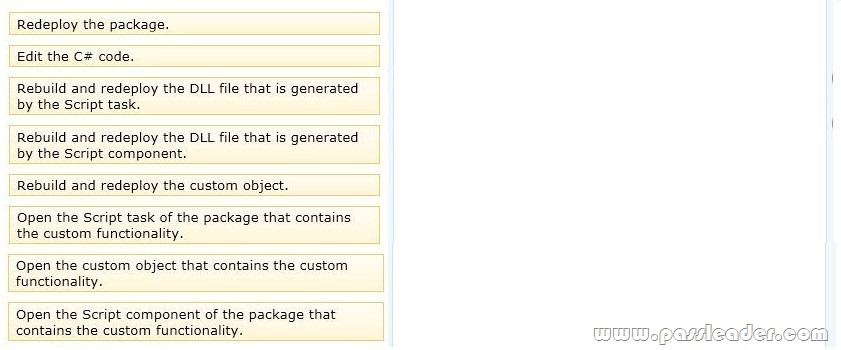
QUESTION 156
Hotspot Questions
You are the data steward at your company. Duplicate customers exist in a Microsoft Excel workbook. You create a Data Quality Services (DQS) knowledge base and matching policy to identify these duplicate customers. You need to identify the duplicate customers. Which option should you use? (To answer, select the appropriate option in the answer area.)
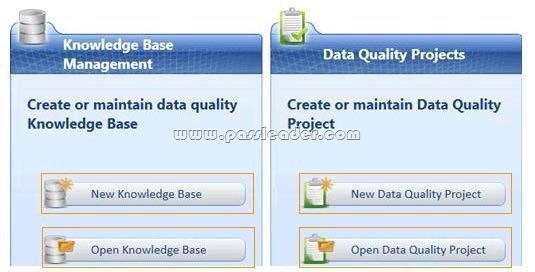
QUESTION 157
Hotspot Questions
You are developing a SQL Server Integration Services (SSIS) package. The data source for the data flow task is a table that has been configured as a change data capture (CDC) table. You are using a CDC Source component to obtain the CDC data. The CDC Source component has the following requirements:
– The output must include metadata columns that indicate which source columns have changed.
– The output must return only one change row per source row that is modified in the current CDC processing range.
You need to configure the CDC Source component. Which CDC processing mode should you select? (To answer, configure the appropriate option or options in the dialog box in the answer area.)
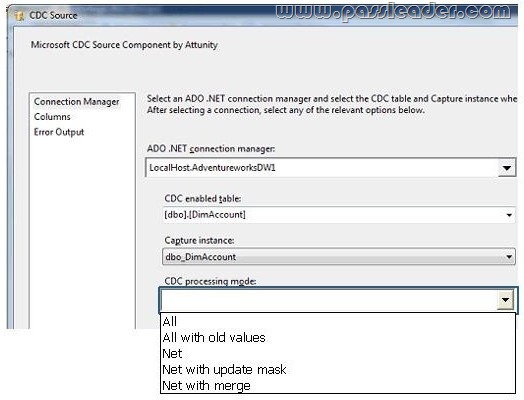
QUESTION 158
Hotspot Questions
You are developing a SQL Server Integration Services (SSIS) package. The package must run a parameterized query against a Windows Azure SQL Database. You need to use the least amount of development effort to meet the package requirement. Which task should you use? (To answer, select the appropriate task in the answer area.)

QUESTION 159
Drag and Drop Questions
You are developing a SQL Server Integration Services (SSIS) package. The package contains an ADO object source variable that holds a result set that was returned by a stored procedure execution. You need to add and configure a container that will execute several tasks for each row in the ADO object source variable. Which three actions should you perform in sequence? (To answer, move the appropriate actions from the list of actions to the answer area and arrange them in the correct order.)

QUESTION 160
You develop a SQL Server Integration Services (SSIS) package that imports Windows Azure SQL Database data into a data warehouse every night. The Windows Azure SQL Database data contains many misspellings and variations of abbreviations. To import the data, a developer used the Fuzzy Lookup transformation to choose the closest-matching string from a reference table of allowed values. The number of rows in the reference table is very large. If no acceptable match is found, the Fuzzy Lookup transformation passes a null value. The current setting for the Fuzzy Lookup similarity threshold is 0.50. Many values are incorrectly matched. You need to ensure that more accurate matches are made by the Fuzzy Lookup transformation without degrading performance. What should you do?
A. Change the similarity threshold to 0.40.
B. Decrease the maximum number of matches per lookup.
C. Change the similarity threshold to 0.85.
D. Increase the maximum number of matches per lookup.
Answer: C
Explanation:
– Similarity threshold. Set the similarity threshold at the component level by using the slider. The closer the value is to 1, the closer the resemblance of the lookup value to the source value must be to qualify as a match. Increasing the threshold can improve the speed of matching since fewer candidate records need to be considered.
Incorrect:
– Maximum number of matches to output per lookup. Specify the maximum number of matches the transformation can return for each input row. The default is 1.
Get the newest PassLeader 70-767 VCE dumps here: https://www.passleader.com/70-767.html (318 Q&As Dumps –> 350 Q&As Dumps –> 377 Q&As Dumps –> 407 Q&As Dumps)
And, DOWNLOAD the newest PassLeader 70-767 PDF dumps from Cloud Storage for free: https://drive.google.com/open?id=0B-ob6L_QjGLpcXZXWUl4dHhIUVk
